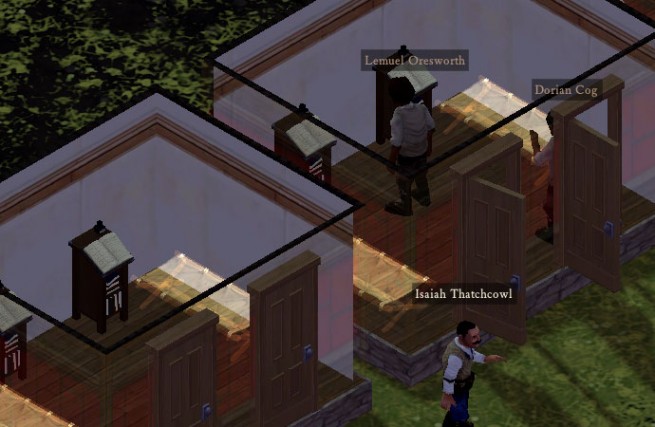Fire! FIRE! FIIIIIIIIIIIIIIIIIIIIIIIIIIIRRRRRRRRRRRREEEEEEEEEEEEE!
Fire! Oh no, fire! Quick! FIRE! FIRE
Our event framework has been in need of enhancement for a while. It is a fantastic framework, but as we add more content we realized that there are a few things we are using it for that are better implemented using some additional systems. Specifically, how players are allowed to interact with different factions and giving the player tools to change their standing with those factions. We wanted to give players a physical control point for all of this (rather than having to use randomly timed events as a control point) so we’ve implemented the Foreign Office.

From a 3x Foreign Office diplo rush attempt: installing cots for more efficient bureaucracy crunch-time.
The Foreign Office is where the player can actually change how other (human) factions feel about them by employing work crews who toil away filling out forms for various requisitions, award applications, and bureaucratic minutiae in order to generate large enough volumes of paperwork to complete diplomatic missions. Just like in real life. With the Bandits, this might be requesting/forging official papers, intercepting trade convoy information and giving it to them in exchange for improved standing, or setting up an uneasy truce. For dealing with the Empire, we already have the prestige system which was intended to be used like this in the first place, so we’re pushing the prestige/favour content into one filing cabinet of the Foreign Office.
Modules! You know them. You love them. You use them to make lots of planks. (Just so we’re all clear, modules are the category of objects that are used by your colonists to do things in buildings: workbenches, beds, ovens, chairs, and even doors.)
Modules have been in a weird place for awhile.
Specifically, modules don’t fit very well into the workshop economy. You can improve your workshops, but it doesn’t have much of an effect on the speed at which you can make new modules – this is governed by an obscure ‘construction’ skill that almost never sees enough use to get leveled.
At the same time, we were facing an issue with certain workshops such as the carpentry workshop; there just isn’t a lot for them to do. Set them to auto-produce planks and forget them, basically.
Lastly, there just weren’t a lot of ways for us, as game designers, to interact with modules. They’re either buildable or not. We want the ability to do things like give players modules that they couldn’t otherwise acquire.
So, what to do?
We figured out what those Cultists have been building in the woods all this time! Yes it’s-
This update will go live to every Clockwork Empires player via Steam!
We have also updated our Clockwork Empires: Development Progress Report!
(Don’t own the game? Clockwork Empires can be purchased on ClockworkEmpires.com via Humble or from Steam.)
Want to hear about all sorts of updates via email plus receive silly images from development? Sign up for the newsletter here.
Major player-facing additions this month
Alpha 45 Full Changelog (non-annotated, for annotated version go here)
We made a decision early on to release iterative progress on systems instead of waiting until systems are done for a number of reasons. It gives you reassurance that development hasn’t stalled when, every month, you can load up the game and see new iterative changes that generally improve upon the previous build. It also has the effect of allowing us to get feedback on the direction we’re going because most of our systems are at least somewhat unique, so we need to do some amount of field testing on them as we go.
One of the downsides to this process is that an unfinished system can often seem worse than the lack of the system entirely. I always picture this somewhat like giving people early access to drive a car as it’s being built: Some things feel very much like a car right away, but then you’re driving around without safety features and it can feel like you were better off before the engine was put in. At this point the analogy breaks down a little because we’re not actually putting your health at risk by testing how a car would work without airbags, but you get the idea!
Today we’re working on murder! Yes, it’s a lovely staple of Victorian gothic horror, particularly the madness of contemplating and planning the act, the dread of the murderer, and the horror of the crime after the fact. It’s all very appropriate for the setting of Clockwork Empires, so of course we shall embrace the act of murder with all the Victorian sensibility we can muster (and sneak in a lovecraftian twist whenever possible).
The problem with murder, however, is that you can’t just have people going around murdering one another. It’s simply not interesting because you’re removing the interesting moving pieces of the game.